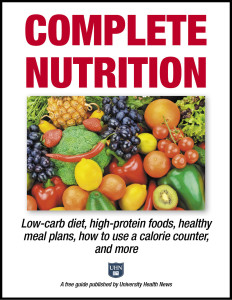What Is Heart Disease?
Many people ask these types of questions: What is congestive heart failure? How do heart attack symptoms in women differ from heart attack symptoms in men)? What is hypertension? And what is heart disease? Yet there is no simple way to define cardiovascular disease, because it’s actually a broad term that refers to many conditions that affect the heart or your blood vessels.
Among the types of cardiovascular diseases are coronary artery disease (CAD), heart failure, heart valve disease, heart rhythm disorders (arrhythmias), peripheral artery disease, carotid artery disease, cardiomyopathy, heart attack, and stroke. You can define cardiovascular disease by understanding the two parts of the word cardiovascular: “Cardio” refers to the heart and “vascular” refers to the body’s arteries and veins.
Eat Right, Starting Now!
Download this expert FREE guide, Complete Nutrition: Low-carb diet, high-protein foods, healthy meal plans, how to use a calorie counter, and more.
Create healthy meal plans and discover the Superfoods that can transform your plate into a passport to better health.
6 Heart Health Facts You Should Know
Take time to learn these and other heart disease facts to better understand the risks involved and the ways to prevent future problems.
#1. Coronary artery disease claims the lives of more than 370,000 Americans annually, but the numbers of people dying of CAD have diminished in recent years as more people adopt healthier lifestyles and CAD treatment continues to improve.
#2. The American College of Cardiology reports that every year about 785,000 people in the U.S. have their first heart attack, while an estimated 470,000 individuals who have previously had a heart attack suffer another one.
#3. If you learn one heart disease fact, it’s that maintaining a healthy weight is one of the most important steps you can take to prevent heart troubles down the road. Even if you feel healthy but are obese, long-term damage to your cardiovascular system could be going on because of excess weight. Dropping a few pounds, if you’re overweight, can also help lower blood pressure. (See also our post “7 Foods That Lower Blood Pressure.”)
#4. The way many people define cardiovascular disease is atherosclerosis and its consequences. Atherosclerosis is sometimes described as “hardening of the arteries.” That’s because cholesterol, fats, and other substances such as white blood cells collect in the walls of the blood vessels that keep the heart supplied with blood—the coronary arteries—and make them stiff. The cholesterol and other materials form plaques. This can create two problems for the heart.
When plaques are first forming, they’re soft. But they can rupture, releasing the “junk” inside. The rupture can also lead to the production of enzymes that cause blood to clot. If the clot is big enough it can block the flow of blood.
Older plaques present a different danger. After a while, soft plaques turn hard and narrow the affected arteries. If the plaque build-up is too great, blood can no longer flow through a blocked artery. No matter what causes the stoppage of circulation in the coronary artery, the result is a heart attack.
#5. One of the often misunderstood heart disease facts is that you can have normal blood pressure but still be at risk for a heart attack. High LDL (“bad”) cholesterol and a history of smoking, for example, can both lead to narrowed coronary arteries and a heart attack. (See also our blog “What’s the Right Blood Pressure for You?“)
#6. Having diabetes raises your risk of cardiovascular disease. One of the reasons for this is that elevated levels of glucose (sugar) in your bloodstream can damage blood vessels over time.
What Is Heart Disease? Sources and Resources
If you have questions, never hesitate to ask your doctor to define cardiovascular disease risks as they pertain to your health and your family history. And look to such sources as the Centers for Disease Control and Prevention (CDC) page on heart disease and the American Heart Association page on coronary artery disease.
See also the University Health News posts “What Causes Heart Attacks—and How to Prevent Them” and “Mild Heart Attack Symptoms: What Do They Mean?”
Yes, heart disease tends to run in families. So the more heart disease facts you can learn about your parents and grandparents, the more you’ll know your own risks. And that might make you more motivated to follow a heart-healthy lifestyle starting today.
Originally published in 2016, this post is regularly updated.
The post What Is Heart Disease? appeared first on University Health News.
Read Original Article: What Is Heart Disease? »
Powered by WPeMatico


